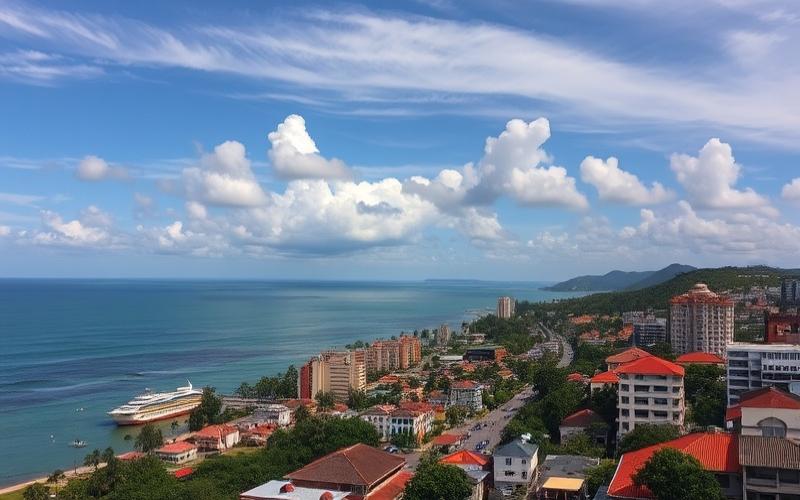
 Published on and written by Cyril Jarnias
Published on and written by Cyril Jarnias
The Dominican Republic has become a preferred destination for foreign real estate investors in recent years. With its white sand beaches, tropical climate, and affordable cost of living, this Caribbean country is attracting more and more international buyers. However, before embarking on a real estate project in the Dominican Republic, it’s crucial to thoroughly understand the legal and tax framework governing this sector. In this article, we will explore in detail the main real estate laws and regulations that every potential investor should know.
A Real Estate Market Open to Foreigners
The Dominican Republic welcomes foreign investors in the real estate sector with open arms. Unlike some countries that impose restrictions on non-resident buyers, Dominican legislation is particularly favorable to international investors. Foreigners enjoy the same rights as Dominican citizens when it comes to acquiring real estate properties, whether it’s land, houses, apartments, or commercial properties.
This openness of the real estate market to foreigners is governed by Law 171-07 on special incentives for foreign retirees and pensioners. This law, adopted in 2007, aims to encourage foreign investment in the country by offering various tax and administrative benefits to non-residents who purchase real estate in the Dominican Republic.
It’s important to note that foreigners can purchase properties in their own name or through a Dominican company. However, there is one restriction regarding the purchase of border lands: foreigners cannot acquire properties located within 20 kilometers of the border with Haiti, except with special government authorization.
Good to Know:
Foreigners can freely purchase real estate in the Dominican Republic, with the same rights as local citizens, except in border areas.
The Dominican Real Estate Legal Framework: What You Need to Know
The real estate sector in the Dominican Republic is governed by a set of laws and regulations aimed at protecting property owners’ rights and ensuring transaction transparency. Here are the main legal provisions to know:
1. Law 108-05 on Real Estate Registration
This law, adopted in 2005, modernized the property registration system in the Dominican Republic. It introduced a safer and more transparent property title system known as “Certificado de Título.” This official document, issued by the Title Registry, guarantees property rights and constitutes irrefutable proof of real estate ownership.
2. Law 5038 on Condominiums
This law governs condominium ownership and establishes the operating rules for condominium buildings. It defines the rights and obligations of co-owners, as well as the management procedures for common areas.
3. Law 158-01 on Tourism Promotion
This law offers tax incentives to investors in real estate projects related to tourism, particularly in areas designated as tourism hubs. It provides exemptions from income taxes, customs duties, and value-added taxes for approved projects.
4. Law 189-11 on Mortgage Market and Trust Development
This law introduced new financial instruments to facilitate access to real estate credit, including real estate trusts. It aims to stimulate the mortgage market and offer new financing options for real estate buyers.
It’s crucial to thoroughly understand these laws and ensure that any real estate transaction strictly complies with the Dominican legal framework. It’s highly recommended to hire a real estate law specialist to guide you throughout the purchase process.
Good to Know:
The property registration system in the Dominican Republic has been modernized to provide greater legal security for property owners. Make sure to obtain a “Certificado de Título” to guarantee your property rights.
Real Estate Taxation in the Dominican Republic: An Attractive Regime for Investors
Real estate taxation in the Dominican Republic is generally considered advantageous for investors, especially compared to many Western countries. Here are the main tax aspects to know:
1. Real Estate Transfer Tax
When purchasing a property, the buyer must pay a transfer tax of 3% of the property value. This tax is due at the time of property registration with the Title Registry.
2. Capital Gains Tax
Capital gains realized from the sale of a property are subject to a 27% tax on the net gain. However, exemptions exist for primary residences held for more than 3 years.
3. Annual Property Tax
The annual property tax, called “Impuesto a la Propiedad Inmobiliaria” (IPI), applies to properties whose value exceeds 8.1 million Dominican pesos (approximately $140,000 USD). The rate is 1% of the value exceeding this threshold. Therefore, many properties are exempt from this tax.
4. Tax Benefits for Foreign Retirees
Law 171-07 offers significant tax benefits to foreign retirees who invest in real estate in the Dominican Republic. These benefits include exemptions from taxes on foreign income, reduced customs duties for importing personal goods, and vehicle tax exemptions.
5. Tax Incentives for Tourism Projects
Investors in real estate projects related to tourism can benefit from significant tax exemptions under Law 158-01. These benefits can include exemptions from income taxes, customs duties, and value-added taxes for periods of up to 15 years.
It’s important to note that the Dominican tax system can be complex and tax laws are subject to change. Therefore, it’s recommended to consult a local tax expert for personalized and up-to-date advice.
Good to Know:
Real estate taxation in the Dominican Republic is generally advantageous for foreign investors, with moderate tax rates and interesting exemptions, particularly for retirees and tourism projects.
Rights and Obligations of Property Owners
As a property owner in the Dominican Republic, you enjoy certain fundamental rights, but you must also fulfill certain obligations. Here are the essential points to know:
Property Owners’ Rights:
1. Exclusive ownership right: Once your property is registered with a “Certificado de Título,” you benefit from exclusive and uncontestable ownership rights.
2. Right of use and enjoyment: You have the right to use your property as you see fit, in compliance with applicable laws and regulations.
3. Rental right: You can rent your property short-term or long-term, subject to compliance with local rental regulations.
4. Sale right: You can sell your property at any time, provided you follow the legal property transfer procedures.
Property Owners’ Obligations:
1. Tax payments: You must pay all applicable taxes, particularly the annual property tax if your property is subject to it.
2. Compliance with condominium regulations: If you own a condominium property, you must comply with the rules established by the homeowners’ association.
3. Property maintenance: You are responsible for maintaining your property and must comply with current safety and hygiene standards.
4. Compliance with local regulations: You must comply with local regulations regarding urban planning, environment, and construction.
It’s important to note that property rights in the Dominican Republic are protected by the Constitution and the legal system provides recourse in case of violation of these rights. However, it’s always recommended to remain vigilant and well-informed about your rights and obligations as a property owner.
Good to Know:
Property owners in the Dominican Republic enjoy strong rights, but must also fulfill certain obligations, particularly regarding taxes and property maintenance.
Recent Regulatory Developments: Towards Modernization of the Real Estate Sector
The regulatory framework of the real estate sector in the Dominican Republic has undergone several significant developments in recent years, aimed at further modernizing and securing real estate transactions. Here are the main changes to know:
1. Digitalization of the Title Registry
The Dominican government has launched a comprehensive digitalization program for the Title Registry. This initiative aims to facilitate access to property information, reduce processing times for applications, and strengthen the security of real estate transactions. Many procedures can now be completed online, greatly simplifying the process of buying and selling real estate properties.
2. Strengthening Anti-Money Laundering Controls
In response to international concerns regarding money laundering, the Dominican Republic has strengthened its controls in the real estate sector. Law 155-17 against money laundering and terrorist financing now imposes enhanced due diligence obligations on real estate professionals, notaries, and lawyers involved in real estate transactions.
3. New Regulations on Short-Term Rentals
Facing the growth of Airbnb-type rental platforms, several Dominican municipalities have adopted specific regulations to govern short-term rentals. These new rules aim to guarantee the quality of accommodations offered and protect the traditional hotel sector. Property owners wishing to rent their properties short-term must now obtain specific authorizations and comply with certain safety and hygiene standards.
4. Development of Real Estate Credit
The Dominican government has taken several measures to facilitate access to real estate credit, particularly for first-time buyers. Law 189-11 on mortgage market development introduced new financial instruments, such as real estate trusts, which offer more flexibility and security to borrowers and lenders.
5. Regulation of Real Estate Development Projects
New regulations have been implemented to govern large real estate development projects, particularly in tourist areas. These rules aim to ensure the environmental sustainability of projects and protect buyers against fraudulent practices. Developers must now obtain stricter authorizations and provide more significant financial guarantees.
These regulatory developments demonstrate the Dominican government’s commitment to modernizing and professionalizing the real estate sector. They offer greater legal security to investors while addressing contemporary challenges in the real estate market.
Good to Know:
The regulatory framework for real estate in the Dominican Republic is evolving rapidly, with a trend toward digitalization of processes and strengthening of controls. It’s crucial to stay informed about the latest developments to invest with peace of mind.
Conclusion: An Attractive Real Estate Market, But One That Requires Good Understanding of the Legal Framework
The Dominican Republic offers numerous opportunities for foreign real estate investors. With a favorable legal framework, advantageous taxation, and a growing market, the country positions itself as a preferred destination for real estate investment in the Caribbean.
However, as with any foreign investment, it’s crucial to thoroughly understand the legal and regulatory context before getting started. Real estate laws and regulations in the Dominican Republic, although generally favorable to foreign investors, can be complex and are constantly evolving.
Therefore, it’s highly recommended to surround yourself with experienced local professionals – real estate law specialist, notary, licensed real estate agent – to guide you throughout your investment project. These experts can help you navigate the subtleties of the Dominican legal system, understand your rights and obligations as a property owner, and ensure your investment is legally secure.
Finally, it’s important to stay informed about regulatory and tax developments that could impact your investment. The Dominican real estate market is dynamic, and authorities continue to work on improving the legal framework to attract more foreign investment.
By following these tips and remaining vigilant, you’ll be well positioned to take advantage of the opportunities offered by the Dominican Republic’s real estate market, while minimizing the risks associated with foreign investment.
Disclaimer: The information provided on this website is for informational purposes only and does not constitute financial, legal, or professional advice. We encourage you to consult qualified experts before making any investment, real estate, or expatriation decisions. Although we strive to maintain up-to-date and accurate information, we do not guarantee the completeness, accuracy, or timeliness of the proposed content. As investment and expatriation involve risks, we disclaim any liability for potential losses or damages arising from the use of this site. Your use of this site confirms your acceptance of these terms and your understanding of the associated risks.























































